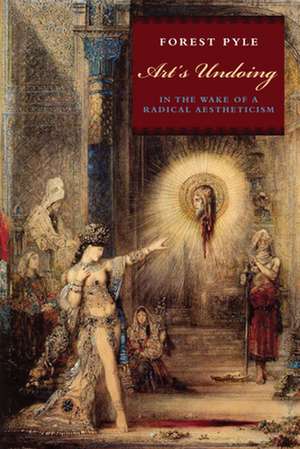Art`s Undoing – In the Wake of a Radical Aestheticism
Autor Forest Pyleen Limba Engleză Hardback – 26 dec 2013
Preț: 590.93 lei
Preț vechi: 729.54 lei
-19% Nou
Puncte Express: 886
Preț estimativ în valută:
113.07€ • 117.83$ • 93.63£
113.07€ • 117.83$ • 93.63£
Carte tipărită la comandă
Livrare economică 03-17 aprilie
Preluare comenzi: 021 569.72.76
Specificații
ISBN-13: 9780823251117
ISBN-10: 082325111X
Pagini: 328
Dimensiuni: 213 x 235 x 24 mm
Greutate: 0.55 kg
Editura: ME – Fordham University Press
ISBN-10: 082325111X
Pagini: 328
Dimensiuni: 213 x 235 x 24 mm
Greutate: 0.55 kg
Editura: ME – Fordham University Press
Recenzii
"Art's Undoing: In the Wake of a Radical Aestheticism proposes a stunning alternative to our habit of thinking of the work of art as an occasion for heightened vision or temporary respite. Like the mind-blowing opening lines of many of Dickinson's poems, Pyle's radical aestheticism undoes the apotropaic function usually assigned to art, and understands poetry not as a domain offering and requiring protection from encroaching forces, but as a darkness-making event and as the "unwilled" imposition of a sensuous apprehension." In this brilliant, beautifully written work of literary criticism that promises to leave its own readers exquisitely undone, Forest Pyle unthreads Shelley, Keats, Dickinson, Hopkins, Rossetti, and Wilde into figures, reflections, traces, and lines that, unlike the Medusa's face, will never resolve themselves into a single, readable, and hence pierce-able image. Anne-Lise François, University of California, Berkeley"This is one of the most powerful and subtle books I've read on 19th-century literature in decades. It's searching, meticulous, and wide-ranging as it pursues its novel, overarching thesis. Pyle brings into striking relief what is powerful and problematic in an important strain of 19th-century literature, setting its poetry in motion all over again. Ian Balfour, York University, Ontario
Notă biografică
Descriere
Deals with radical aestheticism, the term that best describes a recurring event in some of the most powerful and resonating texts of nineteenth-century British literature
